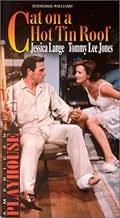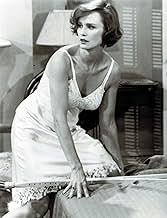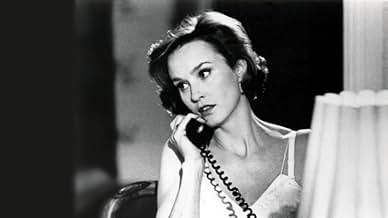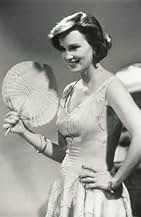IMDb RATING
6.7/10
627
YOUR RATING
An alcoholic and femme fatale face troubles before a family reunion.An alcoholic and femme fatale face troubles before a family reunion.An alcoholic and femme fatale face troubles before a family reunion.
- Won 1 Primetime Emmy
- 1 win & 7 nominations total
- Director
- Writer
- All cast & crew
- Production, box office & more at IMDbPro
Featured reviews
When I watched Maggie/Jessica Lange do that long all-in-one-breath monologue telling Brick how everybody loved him, I said to myself This has got to be the high point in American Theater. It was one great sustained crescendo. It is most incredible that it goes unnoticed.
While I haven't seen very much of the highly-touted 1958 film version of Tennessee Williams's play Cat on a Hot Tin Roof with Paul Newman and Elizabeth Taylor (arguably the most attractive stars of their respective times), the film itself from what I've read was censored and given a tacked on ending to appease the Hayes Code and Catholic League of Decency. I'd imagine the actors were cast well for the parts, but it would likely be best to have the full power and conviction and very human tragedy of Brick to be most effective. Since then the play has been produced countless times in all parts of the country (not least of which on Broadway, where as recent as the past few years an all-black cast was put together for a revival), and as with this 1985 live-taped show, some of it was broadcast as it was for the masses.
I saw the a video of this production, featuring Tommy Lee Jones, Jessica Lange, and Rip Torn, in a Modern Drama class at my old college, and it definitely left an impact after already going over the play in heavy lit-analysis mode. It is, of course, hampered by being a filmed taping of a live performance, but in this limitation it's great to just watch the actors fully embody these characters on their own terms. And, more often than not, it's dynamite; it might even be some of the best acting Torn has ever done, on stage or in film, as the tough "Big Daddy" character who gets a big powerhouse act to spar off of Jones in his conflicted, repressed homosexual character grieving his friend's suicide. Lange, by the way, is excellent in her sultry but depressed wife who is ignored/belittled by Brick.
So, as I can't really give a base of comparison between original film version and this, I can simply say that, for what it's worth, it gives fans of Williams and the play itself their money's worth (or TV-viewing time worth, if it happens to ever play again on a channel). Find it on video if you can!
I saw the a video of this production, featuring Tommy Lee Jones, Jessica Lange, and Rip Torn, in a Modern Drama class at my old college, and it definitely left an impact after already going over the play in heavy lit-analysis mode. It is, of course, hampered by being a filmed taping of a live performance, but in this limitation it's great to just watch the actors fully embody these characters on their own terms. And, more often than not, it's dynamite; it might even be some of the best acting Torn has ever done, on stage or in film, as the tough "Big Daddy" character who gets a big powerhouse act to spar off of Jones in his conflicted, repressed homosexual character grieving his friend's suicide. Lange, by the way, is excellent in her sultry but depressed wife who is ignored/belittled by Brick.
So, as I can't really give a base of comparison between original film version and this, I can simply say that, for what it's worth, it gives fans of Williams and the play itself their money's worth (or TV-viewing time worth, if it happens to ever play again on a channel). Find it on video if you can!
I have an extraordinary attachment to this play. Aside from being my all-time favorite, which I have read at least fifty times, I was also cast as Big Daddy for an attempted high school production, which, fittingly enough for the history of the play, I suppose, was cancelled and replaced with something "more appropriate" under pressure from the school's administration. I saw the original Newman-Taylor version after reading it the first few times, but had heard a lot of raving that the 1958 film was horrible and that this was worlds better. I found a laser-disc copy and watched it this afternoon. I definitely have more complaints with this performance than I expected. I personally wish that the Rip Torn of 'The Insider' and 'Wonder Boys' had been present in the role of Big Daddy, rather than the version I saw, who despite playing the role with an enormous passion, produced a performance which saw his accent slide all over the place, from a few moments of European immigrant on one misguided extreme to Chris Kattan's incomprehensible sketches on SNL at another, the original lines by Tennessee Williams often escape him, and overall, it results in a very streaky and inconsistent characterization. Perhaps this is a result of being filmed live, or perhaps it's a Rip Torn without an additional fifteen years of experience. Jessica Lange also turned in an impassioned role, but she also seemed rather inconsistent. I actually longed for a little of Liz Taylor's cattiness in the first act, but the play as a whole I preferred Lange. My only quibble with Tommy Lee Jones was that he did not seem to make a decision whether Brick was indeed homosexual or not, which I think is important, because the issue of homosexuality, although the most controversial aspect, is not so crucial to the play as the issues of mendacity dissolving his friendship with Skipper. The two are interrelated, but while the belief that Skipper was homosexual would cause him to question his own sexuality, there were times when Jones seemed to actually believe the allegations, moreso than I would have expected from the character. Gooper, Mae, and Big Mama all were the finest I've seen those roles played. The other complaint was with some of the production values. I was glad that it was done realistically rather than expressionistically as Kazan first directed it on Broadway, but the liquor cabinet and bed are supposed to both have an awesome presence on the room, and neither does in this film, nor does the bedroom have the quality of "pale light on weathered wood" Williams specified in the production notes. Also, Big Daddy's entrance in a baseball cap seemed entirely out of place. Worst, however, was the soft-focus quality of the camera. There are some questionable directorial decisions, things I think could have been staged better, but the essence of the play shines through, and most importantly, the third act is nearly flawless. The passionate conflicts that Williams weaves together are communicated, and the play is so good that nearly any group, probably even my little high school troupe, could have moved an audience, even if not displaying master craft.
10peacham
Forget The watered down film version from 1958. forget the ridiculous tacked on "happy" ending between Newman and a Miscast Liz Taylor...This is the ultimate film version of Williams greatest play. The screenplay is direct from William's outstanding revised 1974 text with one of the greatest ending scenes in theatre history. Tommy Lee Jones has never been better than as the alcoholic Brick Pollitt. Jessica Lange is so sexy,manipulative and tortured as Maggie that you don't know if you want to hit her or make love to her. the agony put forth in these two characters manifests itself to perfection in these perfect actors.
As wonderful as Jones and Lange are, they are still outdone by Rip Torn as Big Daddy. 'He's never turned gentleman." Maggie says of her father-in-law and thats the honest truth in Torn's magnetic,engaging and touching performance. His Act II scene with Brick is some of the best screen acting I have ever witnessed. Kim Stanley gives us a very human and warm Big Mamma, unlike Judith Anderson's cold matriarch in the 1958 version and Penny Fuller and David Dukes ooze bile as the Greedy Gooper and Mae. This is a film to be watched over and over. Finally a CAT ON A HOT TIN ROOF on screen William's could be proud of !
As wonderful as Jones and Lange are, they are still outdone by Rip Torn as Big Daddy. 'He's never turned gentleman." Maggie says of her father-in-law and thats the honest truth in Torn's magnetic,engaging and touching performance. His Act II scene with Brick is some of the best screen acting I have ever witnessed. Kim Stanley gives us a very human and warm Big Mamma, unlike Judith Anderson's cold matriarch in the 1958 version and Penny Fuller and David Dukes ooze bile as the Greedy Gooper and Mae. This is a film to be watched over and over. Finally a CAT ON A HOT TIN ROOF on screen William's could be proud of !
10jhb-4
Hello from Joe Bonelli-- a native Mississippian and actor who performs as Tennessee Williams in a one-man show (not an "impersonator" gig). The one-star review of this "Cat on a Hot Tin Roof" by a know-nothing here states that maybe that person doesn't understand or appreciate "over the top southern drama." You got it!! This version of the original Williams script, butchered by Hollywood in 1958-- good film, but NOT "Cat"-- is dead on. Tommy Lee Jones, a Texas native, is, in this version, the best Brick I've ever seen. This part is probably the most difficult male role in the Williams' canon and Tommy Lee pulls it off admirably. I like Jessical Lange very much but do not consider her quite right for this, for Blanche in "Streetcar" (which she also plays in a version that doesn't really work well) or Amanda in "Glass Menagerie" (which she is to play on Broadway in early 2005). Rip Torn and the late, lamented Kim Stanley are excellent in their roles and Williams-- who admired both immensely-- would, I believe, have approved. Now don't get me wrong-- there are some fine aspects to the Hollywood film and good performances all around (especially from the brilliant Burl Ives, recreating his Broadway original, and Madeline Sherwood as Sister Woman (Mae)-- ditto!) But the constraints of the Hollywood Production Code really hurt what could have been a true classic. By the way, Williams appreciated the performances of both Elizabeth Taylor and Paul Newman in the Hollywood bowdlerized version-- as do I. It would have been wonderful to see how these great stars/actors would have handled the original script. I suggest that the writer who doesn't "understand or appreciate over-the-top southern drama" stick to prettily-cast sanitized Hollywood adaptations of great plays and true-to-the-original films of them-- and pass on handing out uninformed opinions about the real thing. You don't have to like a play or a performance-- but you DO need to know something about it before you dismiss fine writing and acting.
Did you know
- TriviaThe original play "Cat On A Hot Tin Roof" by Tennessee Williams opened at the Morosco Theater in New York on March 24, 1955, ran for 694 performances and was nominated for the 1956 Tony Award (New York City) for the Best Play. The play also won the Pulitzer Prize in Drama in 1955.
- GoofsShadow of boom mic is seen on Brick.
- ConnectionsEdited into American Playhouse: Cat on a Hot Tin Roof (1985)
Details
Contribute to this page
Suggest an edit or add missing content































